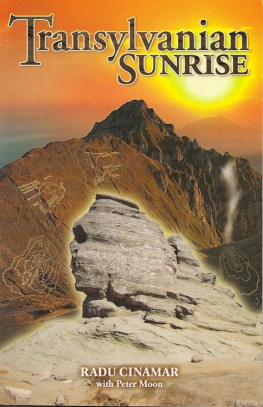E. Gerard - Transylvanian Superstitions
Here you can read online E. Gerard - Transylvanian Superstitions full text of the book (entire story) in english for free. Download pdf and epub, get meaning, cover and reviews about this ebook. year: 2016, genre: Detective and thriller. Description of the work, (preface) as well as reviews are available. Best literature library LitArk.com created for fans of good reading and offers a wide selection of genres:
Romance novel
Science fiction
Adventure
Detective
Science
History
Home and family
Prose
Art
Politics
Computer
Non-fiction
Religion
Business
Children
Humor
Choose a favorite category and find really read worthwhile books. Enjoy immersion in the world of imagination, feel the emotions of the characters or learn something new for yourself, make an fascinating discovery.
- Book:Transylvanian Superstitions
- Author:
- Genre:
- Year:2016
- Rating:3 / 5
- Favourites:Add to favourites
- Your mark:
- 60
- 1
- 2
- 3
- 4
- 5
Transylvanian Superstitions: summary, description and annotation
We offer to read an annotation, description, summary or preface (depends on what the author of the book "Transylvanian Superstitions" wrote himself). If you haven't found the necessary information about the book — write in the comments, we will try to find it.
Transylvanian Superstitions — read online for free the complete book (whole text) full work
Below is the text of the book, divided by pages. System saving the place of the last page read, allows you to conveniently read the book "Transylvanian Superstitions" online for free, without having to search again every time where you left off. Put a bookmark, and you can go to the page where you finished reading at any time.
Font size:
Interval:
Bookmark:
Transylvania might well be termed the land of superstition, for nowhere else does this curious crooked plant of delusion flourish as persistently and in such bewildering variety. It would almost seem as though the whole species of demons, pixies, witches, and hobgoblins, driven from the rest of Europe by the wand of science, had taken refuge within this mountain rampart, well aware that here they would find secure lurking-places, whence they might defy their persecutors yet awhile.
There are many reasons why these fabulous beings should retain an abnormally firm hold on the soil of these parts; and looking at the matter closely we find here no less than three separate sources of superstition.
First, there is what may be called the indigenous superstition of the country, the scenery of which is peculiarly adapted to serve as background to all sorts of supernatural beings and monsters. There are innumerable caverns, whose mysterious depths seem made to harbour whole legions of evil spirits: forest glades fit only for fairy folk on moonlight nights, solitary lakes which instinctively call up visions of water sprites; golden treasures lying hidden in mountain chasms, all of which have gradually insinuated themselves into the minds of the oldest inhabitants, the Roumenians, and influenced their way of thinking, so that these people, by nature imaginative and poetically inclined, have built up for themselves out of the surrounding materials a whole code of fanciful superstition, to which they adhere as closely as to their religion itself.
Secondly, there is here the imported superstition: that is to say, the old German customs and beliefs brought hither seven hundred years ago by the Saxon colonists from their native land, and like many other things, preserved here in greater perfection than in the original country.
Thirdly, there is the wandering superstition of the gypsy tribes, themselves a race of fortune-tellers and witches, whose ambulating caravans cover the country as with a network, and whose less vagrant members fill up the suburbs of towns and villages.
Of course all these various sorts of superstition have twined and intermingled, acted and reacted upon each other, until in many cases it is a difficult matter to determine the exact parentage of some particular belief or custom; but in a general way the three sources I have named may be admitted as a rough sort of classification in dealing with the principal superstitious afloat in Transylvania.
There is on this subject no truer saying than that of Grimm, to the effect that superstition in all its manifold varieties constitutes a sort of religion, applicable to the common household necessities of daily life, and as such, particular forms of superstition may very well serve as guide to the characters and habits of the particular nation in which they are prevalent.
The spirit of evil (or, not to put too fine a point upon it, the devil) plays a conspicuous part in the Roumenian code of superstition, and such designations as the Gregynia Drakuluj (devils garden), the Gania Drakuluj (devils mountain), Yadu Drakuluj (devils hell or abyss), &c. &c., which we frequently find attached to rocks, caverns, or heights, attest the fact that these people believe themselves to be surrounded on all sides by a whole legion of evil spirits.
The devils are furthermore assisted by witches and dragons, and to all of these dangerous beings are ascribed peculiar powers on particular days and at certain places. Many and curious are therefore the means by which the Roumenians endeavour to counteract these baleful influences, and a whole complicated study, about as laborious as the mastering of any unknown language, is required in order to teach an unfortunate peasant to steer clear of the dangers by which he considers himself to be beset on all sides. The bringing up of a common domestic cow is apparently as difficult a task as the rearing of any dear gazelle, and even the well-doing of a simple turnip or potato about as precarious as that of the most tender exotic plant.
Of the seven days of the week, Wednesday (Miercuri) and Friday (Vinire) are considered suspicious days, on which it is not allowed to use needle or scissors, or to bake bread; neither is it wise to sow flax on these days. Venus (called here Paraschiva), to whom the Friday is sacred, punishes all infractions of this rule by causing fires or other misfortunes.
Tuesday, however (Marti, named from Mars, the bloody god of war), is a decidedly unlucky day, on which spinning is totally prohibited, and even such seemingly harmless pursuits as washing the hands or combing the hair are not unattended by danger. On Tuesday evening about sunset, the evil spirit of that day is in its fullest force, and in many districts the people refrain from leaving their huts between sunset and midnight. May the mar sara (spirit of Tuesday evening) carry you off, is here equivalent to saying May the devil take you!
It must not, however, be supposed that Monday, Thursday, and Saturday are unconditionally lucky days, on which the Roumenian is at liberty to do as he pleases. Thus every well educated Roumenian matron knows that she may wash on Thursdays and spin on Saturdays, but that it would be a fatal mistake to reverse the order of these proceedings; and though Thursday is a lucky day for marriage, and is on that account mostly chosen for weddings, it is proportionately unfavourable to agriculture. In many parishes it is considered dangerous to work in the fields on all Thursdays between Easter and Pentecost, and it is believed that if these days are not set aside as days of rest, ravaging hailstorms will be the inevitable punishment of the impiety. Many of the more enlightened Roumenian pastors have preached in vain against this belief, and some years ago the members of a parish presented an official complaint to the bishop, requesting the removal of their cur, on the ground that not only he gave bad example by working on the prohibited days, but had actually caused them serious material damage, by the hailstorms his sinful behaviour had provoked.
This respect of the Thursday seems to be the remains of a deeply ingrained, though now unconscious, worship of Jupiter (Zoi), who gives his name to the day.
To different hours of the day are likewise ascribed different influences, favourable or the reverse. Thus it is always considered unlucky to look at oneself in the glass after sunset; also it is not wise to sweep the dust over the threshold in the evening, or to give back a sieve or a whip which has been borrowed of a neighbour.
The exact hour of noon is precarious on account of the evil spirit Pripolniza, and so is midnight because of the miase npte (night spirit), and it is safer to remain within doors at these hours. If, however, some misguided peasant does happen to leave his home at midnight, and espies (as very likely he may) a flaming dragon in the sky, he need not necessarily give himself up as lost, for if he have the presence of mind to stick a fork into the ground alongside of him, the fiery monster will thereby be prevented from carrying him off.
The finger which ventures to point at a rainbow will be straightway seized by a gnawing disease, and a rainbow appearing in December is always considered to bode misfortune.
The Greek Church, to which the Roumenians exclusively belong, has an abnormal number of feast-days, to almost each of which peculiar customs and superstitious are attached. I will here only attempt to mention a few of the principal ones.
On New Years Day it is customary for the Roumenian to interrogate his fate, by placing a leaf of evergreen on the freshly swept and heated hearthstone. If the leaf takes a gyratory movement he will be lucky, but if it shrivels up where it lies, then he may expect misfortune during the coming year. To ensure the welfare of the cattle it is advisable to place a gold or silver piece in the water-trough, out of which they drink for the first time on New Years morning.
Font size:
Interval:
Bookmark:
Similar books «Transylvanian Superstitions»
Look at similar books to Transylvanian Superstitions. We have selected literature similar in name and meaning in the hope of providing readers with more options to find new, interesting, not yet read works.
Discussion, reviews of the book Transylvanian Superstitions and just readers' own opinions. Leave your comments, write what you think about the work, its meaning or the main characters. Specify what exactly you liked and what you didn't like, and why you think so.













